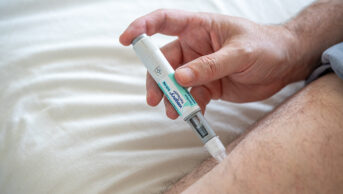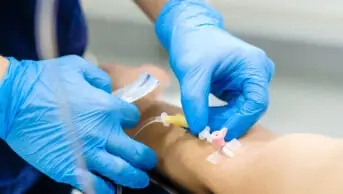
Shutterstock.com
In patients with type 2 diabetes mellitus (T2DM), 6.1% achieved remission solely through weight loss over a median duration of 7.9 years, study results have revealed.
The population-based observational cohort study, published in PLOS Medicine on 23 January 2024, includes data from 37,326 newly diagnosed patients with T2DM in Hong Kong between 2000 and 2017.
Researchers examined the association between weight change after one year of T2DM diagnosis with long-term incidence and sustainability of diabetes remission.
Diabetes remission was defined as two consecutive HbA1c measurements of less than 6.5%, at least six months apart in the absence of glucose-lowering drugs (GLDs), and with no record of GLDs at least three months before these measurements.
After a median of 7.9 years, 2,279 participants (6.1%) achieved diabetes remission with an incidence rate of 7.8 per 1,000 person-years.
The study also reported higher incidence of diabetes remission with increasing weight loss, with adjusted hazard ratios (HRs) of 3.28, 2.29 and 1.23 (P<0.001) for those with more than 10% weight loss within one year of diagnosis, those with 5.0% to 9.9% weight loss, and those with 0.0% to 4.9% weight loss, respectively, compared to people who gained weight.
Diabetes remission was associated with a 31% (HR: 0.69, P=0.014) decreased risk of all-cause mortality.
However, for people who initially achieved remission, 1,531 people (67.2%) returned to hyperglycaemia after a median of 3.1 years.
The authors highlighted that the remission rates of their study were significantly lower than in clinical trials, such as the ‘Diabetes Remission Clinical Trial’ (DiRECT).
DiRECT, results of which were published in The Lancet in 2017, included 306 people with T2DM and revealed that 46% of patients on a low-calorie diet achieved remission of their T2DM after one year.
The study, which was funded by Diabetes UK, led to the launch of an NHS pilot in 2018, through which patients diagnosed with T2DM lost an average of 13kg in three months after being placed on a low-calorie diet.
In November 2022, NHS England tendered a £20m contract to roll out the pilot nationally, which was later awarded to five service providers in June 2023, as part of NHS England’s plan to deliver the ‘NHS Type 2 Diabetes Path to Remission Programme‘.
The authors of the Hong Kong study said “a number of factors” might contribute to the discrepancy between the findings in clinical trials and studies in real-world settings.
“Participants in clinical trials underwent intensive lifestyle interventions that comprised complex dietary intervention, physical exercise, and cognitive behavioural support. These structured programmes included regular monitoring, feedback and reinforcement to provide a holistic approach to managing diabetes,” they said.
“However, it is unclear whether people in real-world settings engaged in any dietary modifications or other targeted interventions.”
Commenting on the study, Claire Davies, diabetes and endocrinology specialist pharmacist at Gateshead Health NHS Foundation Trust, said: “This is an interesting study and it is positive to see ongoing research is being done into T2DM remission.
“It is important to note that the demographics differ between Hong Kong and the UK population thus these studies are not directly comparable or necessarily applicable to UK clinical practices,” she added.
“Low-calorie diet remains an option for some people with T2DM and has been demonstrated to achieve remission in some individuals.
“It is important that treatment options and care are individualised, which may or may not include a low-calorie diet,” said Davies.
2 comments
You must be logged in to post a comment.



Motivation is the key element in managing Type2 through diet alone.
I was shocked when diagnosed three years ago and resolved that I could conquer the problem. Researching available sources showed that, for me, stopping snacks between meals and radically changing the basic staples of my diet (Granary bread,not white;Whole grain rice;full fat rather than low-fat dairy products) relying on foods that digested slowly in the gut. Interestingly, I was told by my surgery that I would have to purchase my own test meter and strips ( perhaps the society could campaign for a change of NHS policy here).
Three years on, I'm still keeping my blood levels within recommended levels
Similar experience for me, diagnosed in Dec 2020 with A1c of 74. Weight loss of 16kg and reconfigured diet brought my A1c down to 42 in 3 months and since then have regained no weight and A1c has never exceeded 42 during the four years since - average is 40.